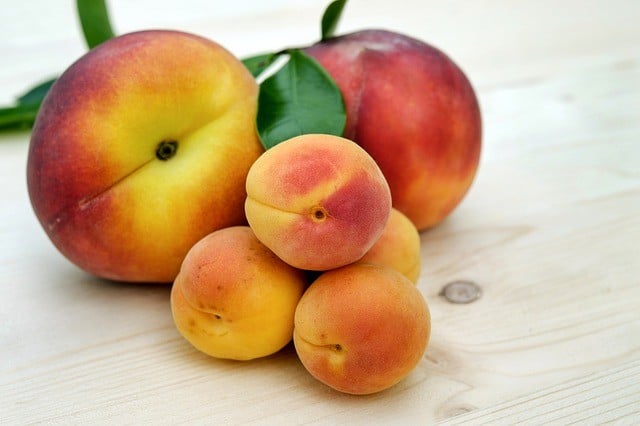
Benefits and properties of apricot
Apricots are around and yellow bone-shaped fruit, they look like a small version of a peach, but they share the acidity of purple plums.
Apricots are a delicious fruit full of vitamins, fiber, and antioxidants. Apricot is extremely nutritious and has many health benefits, such as better digestion and eye health.
Benefits of apricot for health.
-
Nutritious and low in calories
Apricots are very nutritious and contain many important minerals and vitamins.
Apricots are low in calories and fat, in addition to being an excellent source of vitamins A and C.
Read Also: Vitamin C: Benefits, Sources, Deficiencies, and Overdose
Only 2 fresh apricots (70 grams) provide ( source ):
- Calories: 34
- Carbohydrates: 8 grams
- Protein: 1 gr
- Fat: 0.27 grams
- Vitamin A: 8% of the daily value (DV)
- Fiber: 1.5 grams
- Vitamin C: 8% of the DV
- Vitamin E: 4% of the DV
- Potassium: 4% of the DV
Also, this fruit is a source of beta carotene, lutein, and zeaxanthin, powerful antioxidants that help fight free radicals in your body.
It is better to enjoy whole and unpeeled apricots since the skin has large amounts of fiber and nutrients. Be sure not to eat the bone.
Read Also: Six essential nutrients which are very important for the human body
-
High antioxidant content
Apricots contain numerous antioxidants, among which flavonoids stand out. They help protect your body from oxidative stress, which is related to many chronic diseases, including diabetes and heart disease.
The main flavonoids of apricots are chlorogenic acids, catechins, and quercetin [1].
These compounds work to neutralize free radicals, which are harmful compounds that damage cells and cause oxidative stress. Oxidative stress is related to obesity and many chronic diseases, such as heart disease.
Read Also: Why is obesity caused by stress?
-
Apricot benefits and promote eye health
Apricots are an exceptional source of lutein, beta-carotene, zeaxanthin, and vitamin C and vitamin E. These nutrients protect your eyes.
Vitamin A plays a vital role in preventing night blindness, a disorder caused by the lack of clear pigments in the eyes, while vitamin E is a fat-soluble antioxidant that enters directly into the eyes to protect them from radical damage. free.
In the meantime, beta-carotene gives apricots their yellow-orange color. Which serves as a pioneer to vitamin A, which means that your body can convert it into this vitamin.
Other important apricot carotenoids include lutein and zeaxanthin. They are found in the lenses and retinas of the eyes and protect against oxidative stress.
Read Also: 5 Things You Need To Know About Color Blindness
-
Apricot benefits and improve skin health
Eating apricots can benefit your skin. They are rich in antioxidants, which protect against sunlight, pollution and cigarette smoke. These compounds can benefit your skin by reducing your risk of wrinkles and sunburn.
The main causes of wrinkles and skin damage are environmental factors, such as sun, pollution and cigarette smoke.
You can combat some of these damages through a healthy diet full of antioxidants, which apricots provide.
Vitamins C and E, both found in this fruit, can help your skin. In particular, vitamin C protects against damage from UV rays and environmental pollutants by neutralizing free radicals.
Also, this vitamin helps form collagen, which gives skin strength and elasticity.
Beta carotene, another nutrient from apricot, can protect against sunburn.
Read Also: 10 Foods That Are Rich In Vitamin C
-
Apricot can benefit intestinal health
Apricots can promote intestinal health. They are a good natural source of soluble fiber, which feeds healthy intestinal bacteria and can improve digestive health.
One cup (165 grams) of apricots provides 3.3 grams of fiber, which represents 8.6% and 13.2% of the RV for men and women, respectively.
Apricots contain soluble and insoluble fiber. The soluble type dissolves in water and includes pectin, gums and long sugar chains called polysaccharides, while the insoluble type does not dissolve in water and includes cellulose, hemicellulose, and lignin.
Apricots are mainly rich in soluble fiber, which is essential for maintaining cholesterol levels and healthy blood sugar.
Also, fiber slows the flow of food through your digestive tract and feeds your beneficial intestinal bacteria. A healthier intestinal microbiome is associated with a lower risk of obesity.
-
High potassium content
Apricots have a high potassium content.
2 pieces of medium apricots (70 grams) provide 181 mg of this mineral, which is 4% of the DV.
Since potassium works closely with sodium to maintain fluid balance, adequate intake can help maintain healthy blood pressure.
Consuming potassium-rich foods, such as apricots, can help prevent high blood pressure and reduce the risk of stroke.
-
Moisturizer
Like most fruits, apricots are rich in water, which can help regulate blood pressure, body temperature, joint health, and heart rate.
Since most people don’t drink enough water, eating fresh fruit can help them meet their daily needs.
Also, eating apricots can be an easy way to replenish both the water and the loss of electrolytes after exercise, since this fruit offers good amounts of water and potassium.
Easy to incorporate into your diet
Both fresh and dried apricots are easy to incorporate into your diet. You can eat them alone or add them to your favorite dishes or desserts.
Apricots are easy to add to yogurt, salads and some other foods.
If you are used to eating peaches and plums, apricots can be a good way to change your routine.
The Bottom Line:
Apricot is an ideal fruit during all stages of life: childhood, adolescence, adulthood, pregnant women, lactating women, and athletes.
Now that you know the virtues of this sensational fruit, take advantage of all its benefits and always have it in the fruit bowl during its season, yes, organic apricot.




